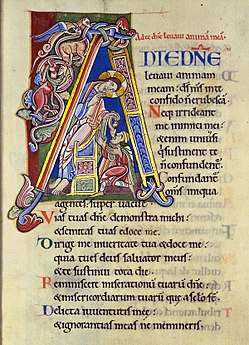Psalm 25
Psalm 25 (Hebrew numbering; Psalm 24 in Greek numbering) of the Book of Psalms, has the form of an acrostic Hebrew poem.
| Psalm 25 | |
|---|---|
← Psalm 24 Psalm 26 → | |
 Psalm 25 [Psalm 24 Vulgate] verses 1–7a in the 12th-century St. Albans Psalter. | |
| Book | Book of Psalms |
| Hebrew Bible part | Ketuvim |
| Order in the Hebrew part | 1 |
| Category | Sifrei Emet |
| Christian Bible part | Old Testament |
| Order in the Christian part | 19 |
This psalm has a strong formal relationship to Psalm 34. Both are alphabetic acrostics, with missing each time the verse Waw, which was added a verse to Pe a prayer of deliverance of Israel. As an Acrostic the verses in the psalm are arranged according to the Hebrew alphabet, with the exception of the letters Bet, Waw and Qoph which together according to Jewish interpreters made reference to the word gehinom (hell).
Dating
In the International Critical Commentary, Charles and Emilie Briggs date this Psalm to "the Persian period prior to Nehemiah," that is, between about 539 and 445 BCE.[1][2][3]
Nineteenth-century Baptist preacher Charles Spurgeon claims "it is evidently a composition of David's later days, for he mentions the sins of his youth, and from its painful references to the craft and cruelty of his many foes, it will not be too speculative a theory to refer it to the period when Absalom was heading the great rebellion against him."[4]
Structure
The psalm is in three parts,[5] In the first portion of the psalm,[6] David:
- professes his desire towards God:
- professes his dependence upon God
- begs direction from God
- professes God's infinite mercy
In the middle portion he addresses his own iniquities [7]
In the last part he pleads
- God's mercy:
- his own misery, distress, affliction and pain.
- the iniquity of his enemies, and deliverance from them.
- He pleads his own integrity,
Uses
Judaism
- Verse 4 is recited responsively during the repetition of the Amidah on Rosh Hashanah.[8]
- Verse 6 is the third verse of V'hu Rachum in Pesukei Dezimra[9] part of the opening paragraph of the long Tachanun recited on Mondays and Thursdays,[10] and part of the final paragraph of the regular Tachanun.[11]
Musical settings
Czech composer Antonín Dvořák set verses 16-18 and 20 to music in his Biblical Songs (1894).
Bibliography
- Commentaires sur les psaumes, d’Hilaire de Poitiers
- Commentaries on the Psalms, John Chrysostom
- Discourse in the Psalms Saint Augustine
- Commentaries for the Psalms, Thomas Aquinas 1273
- Commentaries on the Psalms John Calvin 1557
- A Godly and Fruitful Exposition on the Twenty-fifth Psalme, the second of the Penitentials; (in "A Sacred Septenarie.") By ARCHIBALD SYMSON. 1638. p74.
- The Preacher's Tripartie, in Three Books. The First, to raise Devotion in Divine Meditations upon Psalm XXV. By R. MOSSOM, Preacher of God's Word, late at St. Peter's, Paul's Wharf, London, 1657. Folio.
- Six Sermons in "Expository Discourses," by the late Rev. WILLIAM RICHARDSON, Subchanter of York Cathedral. 1825.
References
- For the words in quotation marks, see Charles Augustus Briggs; Emilie Grace Briggs (1960) [1906]. A Critical and Exegetical Commentary on the Book of Psalms. International Critical Commentary. 1. Edinburgh: T & T Clark. p. 112.
- For the date 539 as beginning the Persion period, see Mark J. Boda; J. Gordon McConville (14 June 2013). Dictionary of the Old Testament: Prophets. InterVarsity Press. p. 415. ISBN 978-0-8308-9583-0.
- For the date of Nehemiah's return in 445, see Gordon Fay Davies; David W. Cotter; Jerome T. Walsh (1999). Ezra and Nehemiah. Liturgical Press. p. 10. ISBN 978-0-8146-5049-3.
- "Archived copy". Archived from the original on 2015-10-22. Retrieved 2015-10-17.CS1 maint: archived copy as title (link)
- Matthew Henry’s Concise Commentary.
- "Commentary on Psalms 25 by Matthew Henry".
- "Psalm 25 Bible Commentary - Matthew Henry (concise)". www.christianity.com.
- The Complete Artscroll Machzor for Rosh Hashanah page 315
- The Complete Artscroll Siddur page 62
- The Complete Artscroll Siddur page 125
- The Complete Artscroll Siddur page 133
- Psautier latin-français du bréviaire monastique, p. 71, 1938/2003
- "Fleurir en liturgie - Liturgie Catholique".
External links
| Wikimedia Commons has media related to Psalm 25. |